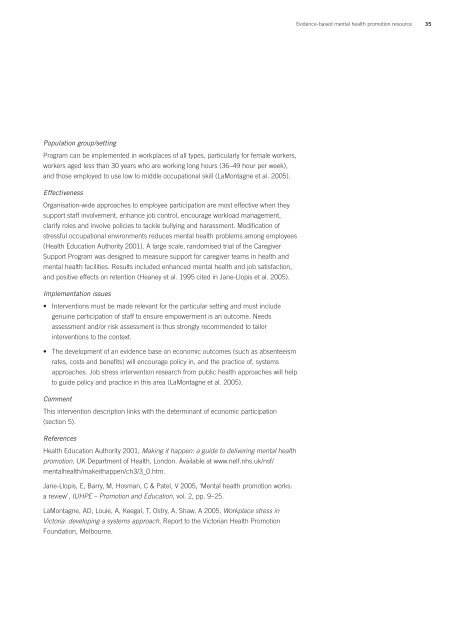Evidence-based mental health promotion resource - health.vic.gov.au
Evidence-based mental health promotion resource - health.vic.gov.au
Evidence-based mental health promotion resource - health.vic.gov.au
Create successful ePaper yourself
Turn your PDF publications into a flip-book with our unique Google optimized e-Paper software.
<strong>Evidence</strong>-<strong>based</strong> <strong>mental</strong> <strong>health</strong> <strong>promotion</strong> <strong>resource</strong>35Population group/settingProgram can be implemented in workplaces of all types, particularly for female workers,workers aged less than 30 years who are working long hours (36–49 hour per week),and those employed to use low to middle occupational skill (LaMontagne et al. 2005).EffectivenessOrganisation-wide approaches to employee participation are most effective when theysupport staff involvement, enhance job control, encourage workload management,clarify roles and involve policies to tackle bullying and harassment. Modification ofstressful occupational environments reduces <strong>mental</strong> <strong>health</strong> problems among employees(Health Education Authority 2001). A large scale, randomised trial of the CaregiverSupport Program was designed to measure support for caregiver teams in <strong>health</strong> and<strong>mental</strong> <strong>health</strong> facilities. Results included enhanced <strong>mental</strong> <strong>health</strong> and job satisfaction,and positive effects on retention (Heaney et al. 1995 cited in Jane-Llopis et al. 2005).Implementation issues• Interventions must be made relevant for the particular setting and must includegenuine participation of staff to ensure empowerment is an outcome. Needsassessment and/or risk assessment is thus strongly recommended to tailorinterventions to the context.• The development of an evidence base on economic outcomes (such as absenteeismrates, costs and benefits) will encourage policy in, and the practice of, systemsapproaches. Job stress intervention research from public <strong>health</strong> approaches will helpto guide policy and practice in this area (LaMontagne et al. 2005).CommentThis intervention description links with the determinant of economic participation(section 5).ReferencesHealth Education Authority 2001, Making it happen: a guide to delivering <strong>mental</strong> <strong>health</strong><strong>promotion</strong>, UK Department of Health, London. Available at www.nelf.nhs.uk/nsf/<strong>mental</strong><strong>health</strong>/makeithappen/ch3/3_0.htm.Jane-Llopis, E, Barry, M, Hosman, C & Patel, V 2005, ‘Mental <strong>health</strong> <strong>promotion</strong> works:a review’, IUHPE – Promotion and Education, vol. 2, pp. 9–25.LaMontagne, AD, Louie, A, Keegal, T, Ostry, A, Shaw, A 2005, Workplace stress inVictoria: developing a systems approach, Report to the Victorian Health PromotionFoundation, Melbourne.



